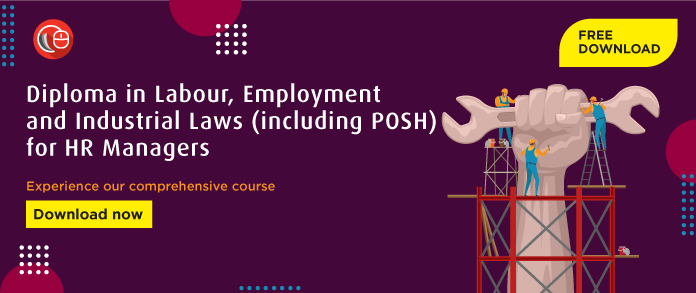This article is written by Smaranika Sen from Kolkata Police Law Institute. This article exhaustively deals with the role of human resources in the time of COVID-19.
Table of Contents
Introduction
Since 2020, the whole world has witnessed the huge impact of the deadly Coronavirus. Our lives have completely changed since then. The pandemic has not only affected the health of the people but also affected the social connections, economic conditions, and livelihood of people all over the world. The pandemic has also impacted the businesses and jobs of people. Many companies have faced huge financial crises and losses due to the pandemic. The operational system of various companies and businesses have changed drastically during these tough times. Amongst various functions of a company, the functional process and role of human resources have eventually changed a lot during the pandemic. Through this article, we will try to analyse the importance and role of human resources in the time of COVID-19.
Concept of human resources (HR)
Every organisation, be it large or small, may be a company or a business that needs to operate systematically to continue the work. The people working in such organisations need to have a piece of good knowledge about the working procedures and whereabouts of the organisation. A human resource is a group of people in any organisation whose work is to find, recruit, train, and administer the job applicants or the people who are interested to join the organisation. Human resources are also called ‘HR’. They look after the benefit programs of the employees. They also play an important role in making deals for the company, creating an efficient work culture in the organisation.
The role of human resources in an organisation, at times, seems very confusing even to the employers of the company. However, their role is vital for an organisation. They enhance the growth of the company and also build up a strong connection between the company and the employees. They act like a bridge and a support system to the employees.
Role of human resources in an organisation
Following are the key roles played by the human resource in an organisation:
- Recruitment: The human resource of any organisation looks after the recruitment section. While recruiting they try to select only those persons who are suitable for their organisation. They also observe the needs of the company and recruit accordingly. For example, if an organisation needs members in the sales department then its main focus is to recruit people that can manage the particular department. The process of recruitment is massive; it requires a lot of research, analysis, referencing the market values, etc.
- Hiring: The human resources also look after the interviewing rounds, confirming the candidates, and selecting them. They also ensure the paperwork is completed which is required to be done to hire someone.
- Payroll: The process of payroll is completely executed by HR. HR looks after all the expenses that need to be reimbursed and raises and bonuses that need to be added.
- Disciplinary action: Human resources also have the power to take disciplinary action against any employer. The HR can take disciplinary actions against any employee as well if the employee is found to be doing any act inappropriately, or not abiding by the rules and regulations of the organisation.
- Policies: Every organisation is required to update their policies annually. The HR of an organisation usually makes official updates to policies or suggest any changes regarding the old policies.
- Maintain employee record: The human resource of an organisation maintains the record of the employees of the organisation. The records include all the skills and performances of the employee along with their details.
Impact of COVID-19
As already stated above, the pandemic has impacted largely the working system of various organisations. The traditional working systems were no longer accessible during the pandemic. During the pandemic, the whole country went into a lockdown. For most of the people, the environment of the lockdown was new. Even the businesses, companies, organisations were initially under complete shutdown for quite a good number of days. Unfortunately, the pandemic was not for just a few days. Therefore, businesses, companies, and organisations were required to adopt an alternative to the traditional approach of working systems. Various organisations adopted a remote work culture. Face to face collaboration, meetings, etc. was replaced by video conferencing, Zoom meetings, etc. Online system of working has been adopted around the world.
Conflict between the role of human resources before the pandemic and during the pandemic
During the pre-pandemic years of our life, the role of human resources was quite different than it is now. During those times their role was to have communication amongst the employees, organize meetings, etc. They have been instrumental in talent acquisition, development of employees, conflict resolution within the team members, etc. At the very early stage, the role of HR was limited only to the development of employees. Over time, their rule has extended to the growth of the company. Even before the pandemic, the role of HR in an organisation was very vital.
After 2020, the role of human resources changed immensely. Philippe Gomes and Marine Fournier, the founder of Digital Workplace Services and Solutions, stated that the colossal shift to the digital workplace that had been observed due to the pandemic had changed the role of HR. They further added that human resources had to redesign and reimagine the way of working in a workplace.
Role of human resources during the pandemic
The remote work culture is the only option during the pandemic for the organisations, businesses and companies to continue surviving. Due to the remote work culture, the role of human resources has increased. They have various responsibilities to address. The main motto of human resources is to establish a common ground for all the employees so that they can work together from diverse geographical and socioeconomic backgrounds.
It is well known that there are various employees in an organisation who before the pandemic used to live in messes or hostels or rented flats or apartments, etc. However, during the pandemic, many employees had to return to their native place and among them, many belong to distinct places when the network connection is still not proper. Now does this mean that such employees will no longer continue in an organisation? It will be very cruel to remove an employee just because of some inevitable circumstances. Therefore, the HR of an organisation needs to establish and address their issues so that even they can work.
We have also observed that various people lost their jobs due to the pandemic. The main reason that various people were either removed or asked to resign was that the organisation was unable to provide salaries and allowances to their employees. The human resources were also required to keep their employees productive, motivated and help the organisation in achieving such a goal where employees need not be removed to combat the loss faced by the organisation during the pandemic. The HR also had the responsibility to provide the company with fruitful work so that the company at the very first instance did not incur any loss.
Changing roles of human resource
Function
According to a survey, the role of HR has become more challenging because of the pandemic. They have had to deal with capital changes as well as sustainability concerns presented by the pandemic. Besides monitoring the virtual workplace of the organisation, the human resources had to also set up a plan for the future about the work culture. The new challenging role of HR demands more developed skills in order to fulfil their role diligently.
Recruitment
Virtual working is hectic but virtual hiring or recruiting is equally demanding. It takes a lot of effort in conducting the entire recruitment process online. Virtual recruiting also demands new technologies and facilities. Special remote onboarding is very challenging for HR. Its demands strengthen technology, communication, engagement skills to foster connections and complete paperwork virtually.
Management
In the pre-pandemic time, the responsibility of the human resource was not to manage any specifically remote teams. But after the pandemic, the human resources had to take the responsibility to manage remote teams. The main challenge was to undertake any remote work with proper infrastructure and support systems. During the pandemic, the companies also started to work with a lesser number of employees like 70% or 80%. The HR had the responsibility to give efficient work for the organisation even with a smaller number of employees.
Technology
The pandemic has shown us that technology is one of the most vital components of our lives. School going students, college students, office goers, etc., all have to avail themselves of the online mode for continuing their studies and works. Similarly, the virtual mode of working demanded better technologies. Human resources have largely been tasked with selecting, learning, and implementing those technology systems. This has especially been observed in the IT departments.
Employee surveys
Human resources even in the pre-pandemic time had to conduct regular surveys for their employees. However, with the onset of the pandemic, conducting surveys has been a little different. Working from home might look very easy and comfortable but in reality, it is not so. It comes with its share of problems. During the pandemic, a lot of employees might have gone through tremendous stress and many of them might have been infected with COVID-19. Therefore, at times the efficiency or engagement of the employees might have been affected. Some of the employees have also taken undue advantage of the online mode of work. This makes it difficult on the part of human resources to identify who is genuine and who is not and also to keep the adequate engagement of the employees with the company.
Public health administration
One of the most challenging roles that human resources had to play is serving as a public health administrator. Every employee of any organisation expects that their workplace has a safe working environment. The human resources had to stay current on fluid policies and regulations related to work safety in order to provide a safe online working environment. They had to make various changes in the workplace such as staggering work schedules, relocating employee workstations, writing mask policies, etc. They even had to communicate those policies to the employees and audit compliance.
Privacy concerns
The internet is a boon as well as a curse. The virtual mode of working during these tough times has been the only alternative way for the survival of any organisation or company. Over time, people have become more aware of their data which are stored on the internet, that is, how the data is being used, if there is any privacy breach, or if their data is being recorded by someone for some unwanted purposes. These concerns are very genuine and every person should be aware of their private information. This concern has also somehow increased the responsibility of human resources. As the human resources record the data of the employees, they have to be very careful about the data which is being stored. They also have to keep an eye that the details are not being used for any unwanted purposes and there should not be any privacy breach of any of the employees. In the pre-pandemic era, this workload was there, but with everything shifting to online mode, the responsibility has increased quite a lot. Privacy breaches may take place by identity theft where any person online can use another’s identity and can do several wrongdoings, their laptops could be hacked and any important documents can be stolen, etc.
Role of human resources as a legal authority in an organisation
Human resources also play a role as a legal authority in an organisation. They act as a quasi-judicial body and try to solve the disputes of the employees. To solve such issues they are required to know the Industrial Disputes Act, 1947. Human resources are known for hiring employees to an organisation and also regulate the resignation process of any employee. All this work of hiring and resignation or asking an employee to resign consists of a lot of legal work like making contracts, signing of contracts, negotiations, etc. They are also required to follow different provisions of the Indian Contract Act, 1872. At times, they are required to draft leave policies for a company, and for this, they need to know the State Wise Factories and Establishments (National, Festival and other Holidays) Act. They are further required to protect the employees from any sort of harassment, abuse, etc. However, they do not have the power to solve all the legal issues. Their power as a judicial authority is quite limited. Some organizations even have a separate judicial body for solving any legal matters.
If in any organisation there is a case of any sexual harassment, usually the human resource managers are the first recipient of such complaint. They are also required to draft the sexual harassment policies and formation of the internal complaints committee. Thus, a human resource manager needs to know the laws, especially the Sexual Harassment of Women at Workplace (Prevention, Prohibition and Redressal) Act, 2013. This will help them form effective laws for an organisation and it will also help solve any cases regarding sexual harassment.
Every organisation needs to deal with labour issues. This brings the human resource to form rules and regulations in compliance with the legislation of the country. Therefore, the human resources must know the Factories Act, 1948 to deal with the labour issues as well as to form rules and regulations in compliance with it. It has been observed that many large companies are trying to train human resource managers about the Factories Act. The Act mostly provides the basic rights and interests of the workers, and also states provisions that guarantee them with proper sanitation, ventilated workspace, etc.
Every employee wants a secured life. They also try to work in organisations that provide them with benefits like retirement pension, medical care, housing loan benefits, insurance benefits, perks of post-retirement, etc. All these rules and regulations are made by human resources. Thus, knowing the Employees Provident Fund and Miscellaneous Provisions Act, 1947 enhances their ability to make such laws and regulations which will be beneficial for the employees and also that such rules and regulations comply with the legislation of the country. Regarding the formation of rules for medical benefits or insurance policies, HR should also know the Employees State Insurance Act, 1948.
One of the most vital policies of any organisation is its policy regarding the maternity leave period. Each organisation has certain rules and regulations regarding maternity leave. Human resources make such rules and regulations. Therefore, they need to know the Maternity Benefit Act, 1962. The Act states the benefits and the rights of a mother during her pregnancy and post-pregnancy.
There must be certain rules and regulations to provide financial protection for employees in case of any labour accidents. Therefore, it is the responsibility of the human resources to make such laws in compliance with the Workmen’s Compensation Act, 1923. The Act provides financial protection to the workers in case of any injury at the time of the work.
Gratuity is a part of a salary that an employee receives as a token of gratitude for the services performed during their employment tenure. Generally, an employee is entitled to gratuity if the employee has completed one year of service in a particular organisation. Therefore, human resources must know about the Payment of Gratuity Act, 1972.
It is an essential work of any human resource manager to provide wages to the employees of an organisation monthly. The Payment of Wages Act, 1936 ensures the standards for assessing the remuneration of the employees and also checks that the salaries are governed as per the industry standard. Therefore, human resources must know the provisions of the Act. If the HR is required to give bonuses for the employees, he/she should first know the provisions of the Payment of Bonus Act, 1965 to know who is entitled to get a bonus, or how much bonus can be given to an employee, etc.
Legal changes that have taken place due to online work
Due to the online mode of working, the transparency between the employees and the human resources has been reduced nowadays. There have been a lot of times when the employees have faced harassment, abuse from other colleagues which was unnoticed by the HR manager or it was not possible to know. There have been instances like an employee of an organisation has shown up shirtless in a virtual meeting with a manager who was a woman. At that very point in time, the HR manager couldn’t know about such online harassment. In an office, such kind of harassment is not quite possible. However, in the online mode of working it has been observed that harassment has increased a lot.
Sometimes it has also been observed that in a Zoom meeting some unknown person with their camera turned off has stated vulgar and abusive comments. It has not been easy for an HR manager to identify the main culprit from behind the computer or laptop screens. There have also been instances wherein a zoom meeting inappropriate screenshots of the participants of a meeting were taken and later used for trolling and harassing. There have been other instances as well. Now the problem that has arisen is that previously this kind of harassment was not there, therefore, the rules and regulations were also not made in such a way to combat such harassment. However, now the times have changed and the rules and regulations must be made in such a way that online harassment can be reduced and the offenders must get proper punishments.
Due to COVID-19, the financial standards of every organisation has been more or less affected. Therefore, various policies which were previously made regarding salaries, allowances, retirement benefits, etc have been changed. This is creating huge confusion. There is also certain dissatisfaction among the employees regarding their reduced salaries and reduction of bonuses. Therefore, the HR department should look into this matter and make such laws and policies which will be beneficial to both the employees and the organization.
Future of human resources
The reshaped labour force and working style of various organisations or companies in these tough times have diminished various opportunities but have also increased jobs or opportunities in some departments. Some massive importance has been observed in the roles of human resources in an organisation. It can be said that human resources can lead organisations in navigating the future. Some of the jobs or opportunities which might be there for human resources in near future are:
- Director of well being.
- Work from the home facilitator.
- Human-machine teaming manager.
- Strategic human resources business continuity director.
- Human resources detective, etc.
Conclusion
We all pray that the pandemic ends soon. However, some changes which have been brought about in various aspects of our lives due to the pandemic might remain more or less the same. One of the aspects can be the remote work culture. Various organisations have stated that they might continue this system of working even after the pandemic ends. Companies like Facebook have even stated that if any employee can provide sufficient and effective work from home, they can permanently do that. This clearly shows that human resources have a very vital role to play in the future as well. Thus, the human resources department must learn more skills to empower the digital workplace more effectively.
References
- https://eightfold.ai/blog/pandemic-role-of-human-resources/
- https://www.peoplematters.in/amp-strategic-hr-role-of-hr-pre-post-covid-world-28323#aoh=16267148338274&referrer=https%3A%2F%2Fwww.google.com&_tf=From%20%251%24s
- https://hbr.org/2020/08/21-hr-jobs-of-the-future
- https://www.shrm.org/hr-today/news/hr-news/pages/hr-managers-rethink-their-work-coronavirus-pandemic.aspx
- https://www.lucidchart.com/blog/what-does-hr-do
LawSikho has created a telegram group for exchanging legal knowledge, referrals, and various opportunities. You can click on this link and join:
 Serato DJ Crack 2025Serato DJ PRO Crack
Serato DJ Crack 2025Serato DJ PRO Crack










 Allow notifications
Allow notifications


